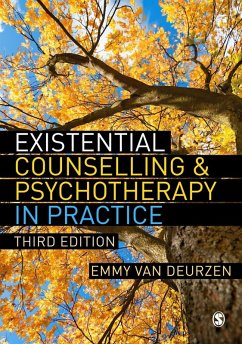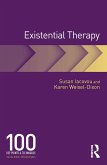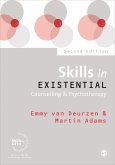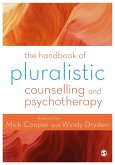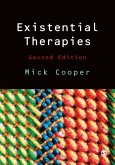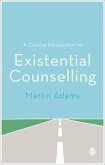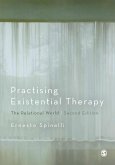Offering a concrete framework and practical methods for working from an existential perspective, the bestselling Existential Counselling and Psychotherapy is now in its third edition.
Central to the book is the belief that many of our problems arise out of the essential paradoxes of human existence, rather than from personal pathology. From this perspective, the purpose of counselling and therapy is not viewed as problem-solving, but as a mean of enabling people to come to terms with living life as it is, with all its inherent contradictions.
Emmy van Deurzen, a leading existential philosopher and therapist, presents a practical method of working, using systematic observation, clarification and reflection to help clients rediscover their inner strengths. She shows how personal assumptions, values and talents, once acknowledged, can be turned to constructive use. Using wide-ranging case examples, the author also demonstrates the effectiveness of the existential appoach in many different situations - from crisis work to dealing with chronic unhappiness.
The existential approach is a well-respected form of psychotherapy, but most writing on the subject tends to be heavily theoretical. This book offers a practical and accessible alternative, which will be invaluable to those in training as well as to more experienced practitioners.
Central to the book is the belief that many of our problems arise out of the essential paradoxes of human existence, rather than from personal pathology. From this perspective, the purpose of counselling and therapy is not viewed as problem-solving, but as a mean of enabling people to come to terms with living life as it is, with all its inherent contradictions.
Emmy van Deurzen, a leading existential philosopher and therapist, presents a practical method of working, using systematic observation, clarification and reflection to help clients rediscover their inner strengths. She shows how personal assumptions, values and talents, once acknowledged, can be turned to constructive use. Using wide-ranging case examples, the author also demonstrates the effectiveness of the existential appoach in many different situations - from crisis work to dealing with chronic unhappiness.
The existential approach is a well-respected form of psychotherapy, but most writing on the subject tends to be heavily theoretical. This book offers a practical and accessible alternative, which will be invaluable to those in training as well as to more experienced practitioners.
Dieser Download kann aus rechtlichen Gründen nur mit Rechnungsadresse in A, D ausgeliefert werden.
'This latest edition of the classic text Existential Counselling and Psychotherapy in Practice preserves the accessibility and focus on actual practice which made the original essential reading for all existential therapists, while incorporating new material on working with emotions and dreams, alongside valuable suggestions in every chapter for discussion and reflection. It is authoritative without being dogmatic, and in the honesty and clarity with which it presents this most lively and vibrant way of working cannot fail to inspire any therapist wishing to engage creatively with the problems of living which clients bring to the consulting room' -
Professor Simon du Plock, Metanoia Institute & Middlesex University
'In this third edition of the classic, Existential Counselling and Psychotherapy in Practice, Deurzen offers her confident down-to-earth account of existential practice now with a valuable new overview of the philosophers who have influenced this perspective. She manages to show concretely how existential philosophy is practiced without reducing it to doctrine or method. The text provides an antidote to the contemporary thinning out, through technique and expertise, of what psychotherapy should be; a vigorous and passionate dialogue about human life and how to live it. Highly readable and inspiring, this text remains a stalwart within the increasing literature on existential therapies' -
Greg Madison, PhD., author, The End of Belonging and co-editor of the Journal of Existential Analysis and Existential Therapy: Legacy, Vibrancy and Dialogue
Professor Simon du Plock, Metanoia Institute & Middlesex University
'In this third edition of the classic, Existential Counselling and Psychotherapy in Practice, Deurzen offers her confident down-to-earth account of existential practice now with a valuable new overview of the philosophers who have influenced this perspective. She manages to show concretely how existential philosophy is practiced without reducing it to doctrine or method. The text provides an antidote to the contemporary thinning out, through technique and expertise, of what psychotherapy should be; a vigorous and passionate dialogue about human life and how to live it. Highly readable and inspiring, this text remains a stalwart within the increasing literature on existential therapies' -
Greg Madison, PhD., author, The End of Belonging and co-editor of the Journal of Existential Analysis and Existential Therapy: Legacy, Vibrancy and Dialogue

